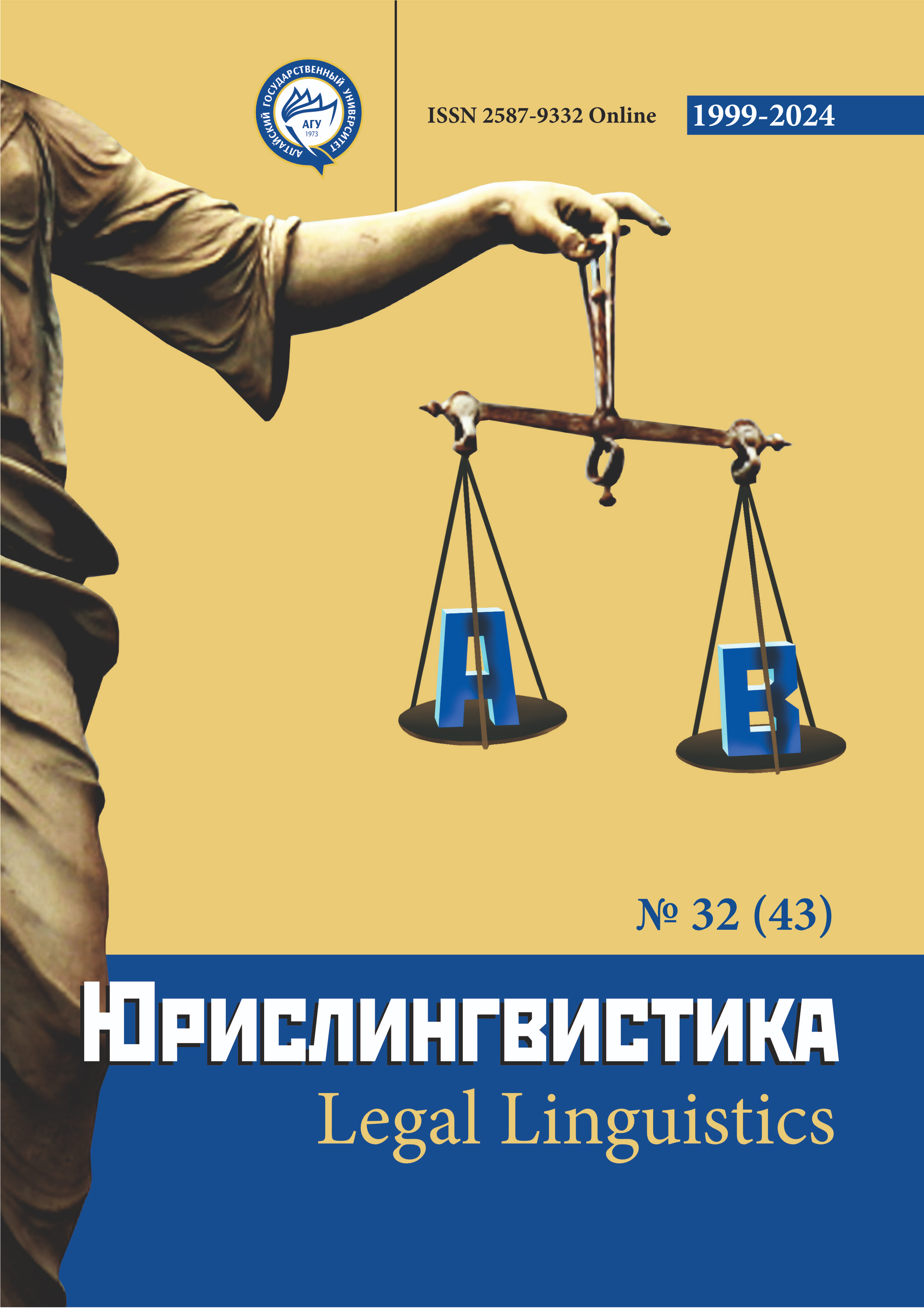Forensic Linguistics: Essence, Structure, Regularities, Functions
УДК 343.54, ББК 67.408.113
Abstract
One of the key provisions of the concept of forensic expertology by A. I. Vinberg and N. T. Malakhovskaya is the provision on the so-called subject forensic sciences - subsystems of forensic expertology formed as a result of the transformation of data from fundamental (parent) sciences based on the needs of legal proceedings. The article considers forensic linguistics as a new forensic science, which appeared as a result of transformation of linguistics as a fundamental science. It is shown that forensic linguistics is a source of special linguistic knowledge applied in the form of forensic authorship examination, forensic examination of sound recordings, forensic linguistic examination and forensic examination of intellectual property objects. The article considers the essence of forensic linguistics as a forensic science, as well as its structure, regularities and functions.
Downloads
Metrics
References
Аверьянова Т. В. Судебная экспертиза. Курс общей теории. М., 2006.
Антипов Г. А. Гносеологический анализ форм взаимодействия наук / Взаимодействие наук как фактор их развития. Новосибирск, 1988.
Винберг А. И., Малаховская Н. Т. Судебная экспертология (общетеоретические и методологические проблемы судебных экспертиз). Волгоград, 1979.
Галяшина Е. И. Судебное речеведение: учебник. М., 2020.
Кедров Б. М. Проблемы логики и методологии науки. Избранные труды. М., 1990.
Кузнецов В. О. К вопросу об экспертных понятиях в судебной лингвистической экспертизе / Теория и практика судебной экспертизы. – 2020. Т. 15. – № 1. URL: https://doi.org/10.30764/1819-2785-2020-1-29-41
Матвеева О. Н., Вязигина Н. В., Холоденко Ю. В. и др. Судебная лингвистика: монография. Барнаул, 2015.
Основы судебной экспертизы. Ч. 1. Общая теория / Отв. ред. Ю. Г. Корухов. М., 1997.
Основы судебной экспертологии: учебно-методическое пособие. М., 2023. URL: https://doi.org/10.30764/978-5-91133-267-9-2023
Россинская Е. Р. Современная судебная экспертология – наука о судебной экспертизе и судебно-экспертной деятельности / Теория и практика судебной экспертизы. – 2015. – № 4 (40).
Россинская Е. Р., Галяшина Е. И., Зинин А. М. Теория судебной экспертизы (Судебная экспертология) / Под ред. Е. Р. Россинской. М., 2016.
Судебно-почерковедческая экспертиза: общая часть: теоретические и методические основы / Под науч. ред. В. Ф. Орловой. М., 2006.
Сычева Л. С. Пути формирования «стыковых» наук / Взаимодействие наук как фактор их развития. Новосибирск, 1988.
Чеснокова Е. В., Усов А. И., Омельянюк Г. Г., Никулина М. В. Искусственный интеллект в судебной экспертологии / Теория и практика судебной экспертизы. – 2023. – Т. 18. – № 3. – С. 60-77. URL: https://doi.org/10.30764/1819-2785-2023-3-60-77.
Copyright (c) 2024 Виталий Кузнецов

This work is licensed under a Creative Commons Attribution 4.0 International License.
The authors, which are published in this journal, agree to the following conditions:
1. Authors retain the copyright to the work and transfer to the journal the right of the first publication along with the work, at the same time licensing it under the terms of the Creative Commons Attribution License, which allows others to distribute this work with the obligatory indication of the authorship of this work and a link to the original publication in this journal .
2. The authors retain the right to enter into separate, additional contractual agreements for the non-exclusive distribution of the version of the work published by this journal (for example, to place it in the university depository or to publish it in a book), with reference to the original publication in this journal.
3. Authors are allowed to post their work on the Internet (for example, in a university repository or on their personal website) before and during the review process of this journal, as this may lead to a productive discussion, as well as more links to this published work (See The Effect of Open Access).











